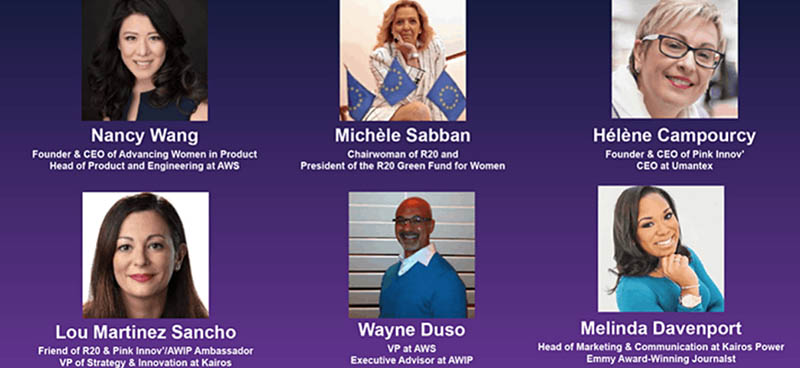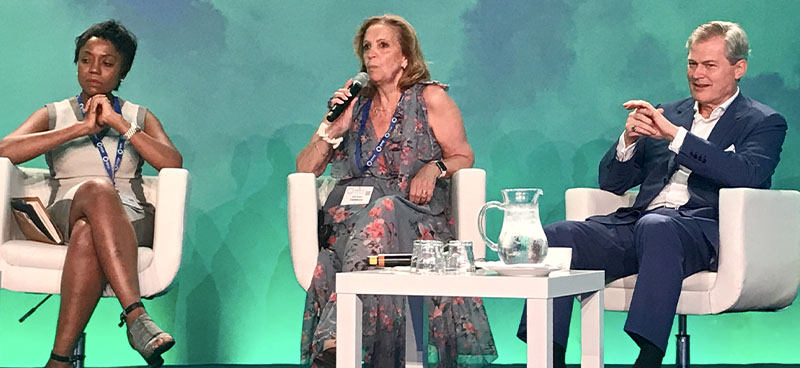
In the past decade, women have made great strides attaining key leadership roles in technology, education, and politics. Another area that has shot to international focus, inspired by the Rio+20 agreement (in 2012) is climate change.
Because women typically provide for their families, for example, by sourcing and sometimes physically hauling water, food, and fuel, and often earn less incomes, climate change disproportionately affects women. Therefore, according to the United Nations Women organization, women’s economic empowerment should be a focus of green economics and climate change.
But not only should women be recipients of climate initiative, they should actively lead them. In fact, the world of climate change can also be a ripe space for rising women leaders. One example is Michele Sabban, President of the R20 Regions of Climate Action and also the President of the FMDV – Global Fund for Cities Development. Michele started the R20 Green Fund for Women in 2011 with former Governor of California, Arnold Schwarzenegger, with the support of the United Nations. Its mission is empowering women in the fight for climate change. Michele agrees that women are most affected by climate change – and the R20 Green Fund was set up for the purpose of providing women the means to lead on-the-ground initiatives leading to responsible development and solidarity.
This strategy aligns with other efforts from US-based climate change activists, such as Katharine Wilkinson, the Vice President of Communication & Engagement at Project Drawdown. She and her team included educational investment in women and girls as one of its three recommendations for women empowerment via climate change. More educated women causes fewer births and thus fewer demands on Earth’s limited resources. Instead, educated women dedicate more attention and care to each child, which also proportionally increases their chances for economic freedom and success.
There are also similar movements in the corporate world: in 2019, Amazon made a pledge to meet the Paris Agreement 10 years early, which effectively calls upon signatories to be net zero carbon across their businesses by 2040. Kara Hurst, Amazon’s current Chief Sustainability Officer, is a firm believer of sustainability through investing in women’s economic empowerment – having co-authored studies on women and sustainability for the climate nonprofit BSR.org. Her thoughts are echoed by Wayne Duso, Vice President of File, Hybrid Edge, and Data Services at Amazon Web Services, “Climate change is such an important topic, and it is an opportunity for corporations like Amazon to make a positive impact in not just climate change but also the populations most affected.”
There are also two international NGOs who are passionate about the cause of climate change and what it can mean to women empowerment: Advancing Women in Product (AWIP) and Pink Innov’, who recently celebrated their global partnership in a webinar that featured international climate change activists, corporate leaders, and NGO founders. Both NGOs focus on empowering more women leaders in tech, which includes the growing space of climate change. The webinar was moderated by Melinda Davenport, the Emmy-award winning journalist and communications executive.
Lou Martinez Sancho, the VP of Innovation at Kairos Power, a mission-driven clean energy company based in the Silicon Valley, said during the webinar, “The energy space is a great stage for gender equality; I want more women scientists and changemakers to be involved, because climate change is going to be an impact that we cannot ignore.”
Echoing her thoughts was Helene Campourcy, the Founder & CEO of Pink Innov’, a network of executive-level women and their allies active in France and Europe. “Pink Innov’ is dedicated to empower its C-level innovation expertise and members like Lou, especially in collaboration with our partner R20 and Michele.”
We have seen past examples of where together – industry, NGO, and governmental organizations can create positive impact and change. And through any of these organizations, many just like them, or through your own efforts, women can lead the way to a better future for everyone.’
*Note: an earlier version of this article attributed Kath Wilkinson as the Founder of Project Drawndown. We have since updated her title to Vice President of Communication & Engagement at Project Drawdown.


